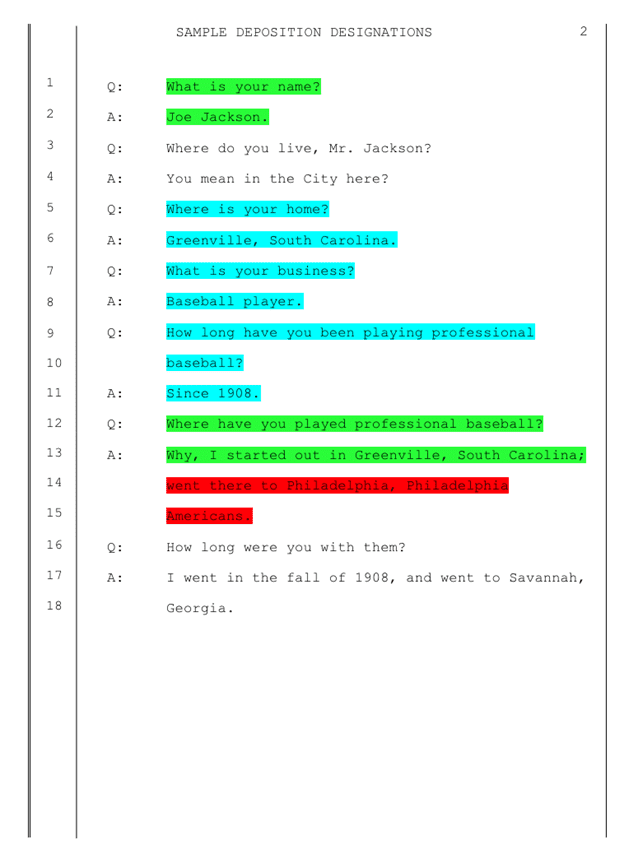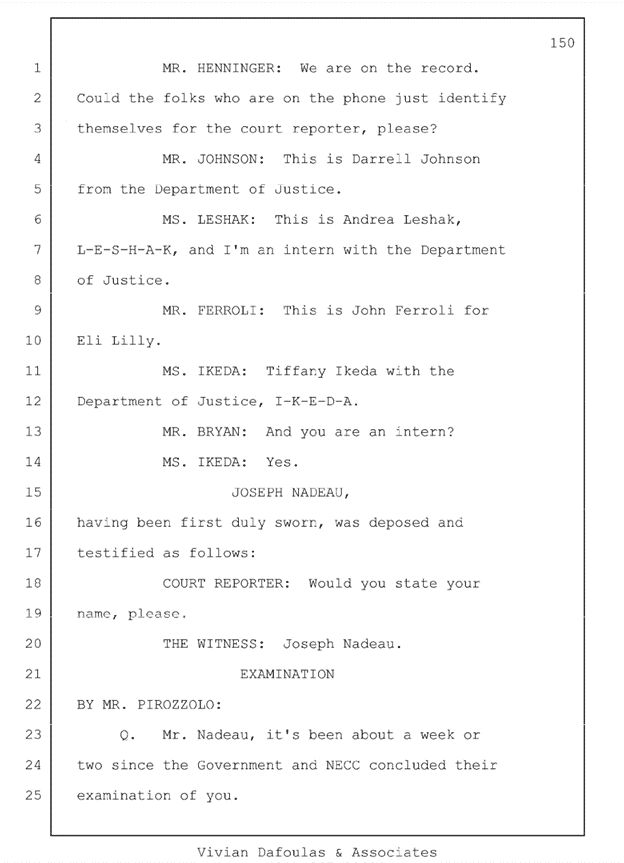4 Excellent Deposition Transcript Samples (Plus Tips!)
Check out these four deposition transcript samples, perfect for reference for beginners. Learn how to write, format, and refine with expert tips.

Staring at a blank page when you’re about to start a deposition transcript can feel pretty daunting—but don’t worry!
We’ll walk you through the basics of deposition transcription, show you when it’s most useful, and even throw in some deposition transcript samples to get you started. Be sure to read from top to bottom so you don’t miss a thing.
What Is Deposition Transcription?
Deposition transcription is the process of turning spoken sworn testimony from a recording into a written document. Why is this crucial? Because a transcribed deposition ensures that every detail of a witness’s testimony is captured accurately and nothing gets lost in translation.
Once the deposition is transcribed (you can use a deposition transcription service or manually transcribe it yourself), this document becomes a go-to reference during court proceedings or legal consultations.
When To Use A Deposition Transcript?
Can you imagine trying to recall every word a witness said months after a deposition? Even with a recording, having to fast-forward and rewind is a real pain.
That’s where transcripts come in handy. They provide a written record of all that was said, making them invaluable during trials or appeals. You can search for what you need without the tedious task of jumping back and forth on a recording.
What else can legal transcription services transcribe for law offices?
4 Best Deposition Transcript Samples and Examples
If you’re hoping to see some excellent examples of deposition transcripts, then you’re in the right place. Here are some of the top deposition transcript samples available to give you an idea of what the final product should look like.
1. Mock Deposition Transcript Sample
From the careful listing of everyone present to the exact words spoken during the questioning, this example neatly organizes all the essential details, making it super easy to follow along.
It includes essential elements like clear speaker identification, meticulous record of dialogue, and organizational details such as the date, location, and participants.
United States District Court
Date: June 15, 2024
Present:
Transcription:
|
What’s to Love About This Deposition Transcription Example?
- Lists the court, case number, witness name, date, location, and time.
- Names all parties present, including the witness, attorneys, and the court reporter, ensuring clarity on who is involved.
- Each exchange between the attorney and the witness is clearly marked with “Q” for question and “A” for answer.
- Every speaker’s name is indicated before their dialogue, minimizing confusion about who is speaking.
- Interjections by attorneys or notes by the court reporter (e.g., microphone adjustments) are included to give a full picture of the deposition environment.
2. NYSD Sample Deposition
If you’re a legal pro or a court reporter diving into how deposition designations are formatted, this sample is your go-to guide. It’s especially handy for anyone gearing up for trial. Consider this sample a practical tool in your legal toolkit.

See the full deposition transcript example here.
What’s to Love About This Deposition Transcription Sample?
- Excellent example of segmenting and formatting depositions for trial.
- Each speaker is clearly marked, making the transcript easy to follow and well-organized.
- Sticks to the court’s formatting rules, ensuring everything is up to snuff for legal proceedings.
3. Deposition Transcript of Joseph Nadeau
This is an actual transcript from a legal deposition that took place in Rhode Island, involving EMHART Industries, Inc. and multiple other parties, including New England Container Company and the United States Department of the Air Force.

See full deposition transcript example here.
What’s to Love About This Deposition Transcription Example?
- The document begins with a detailed header that introduces the case, all involved parties, and the setting—essential for understanding the context of the deposition.
- Line and page numbers are clearly marked throughout, which simplifies referencing and navigating the document during review or court proceedings.
- Each speaker is clearly labeled before their statements, making it easy to follow the dialogue and understand who is speaking at any given time.
- The transcript maintains a clean and professional format, which not only aids readability but also ensures that the document meets legal standards.
- The absence of spelling and punctuation errors contributes to the overall precision and professionalism of the transcript, which is crucial in legal settings where every detail matters.
4. Paralegal Bootcamp Sample Depositions
If you’re a paralegal or legal pro looking to sharpen your deposition summary skills, this guide is your new best friend. It includes example deposition transcripts along with tips for beginners.
See the sample deposition guide here.
What’s to Love About This Deposition Transcription Example?
- It breaks down different methods to summarize depositions, so you can find the one that best fits your needs.
- Loads of actionable advice to boost the quality of your summaries. You’ll be crafting Whether you’re just starting out or you’re a seasoned pro, this guide’s clean and simple layout makes it super easy to follow.
Tips for Writing a Strong Deposition Transcription
Writing a strong deposition transcription is both an art and a science. It requires attention to detail, an understanding of legal terminology, and a keen ear for nuance. Here’s how you can master the process:
Prepare Your Equipment
Quality starts with great sound. Before anything else, check your recording equipment. Use high-quality mics and ensure everything is in perfect working order to avoid garbled or unclear audio, which can make transcription a nightmare. If you’re new to transcription, consider using a transcription template.
Create a Quiet Workspace
Your recording environment matters a lot. Choose a quiet room—think of it as setting up your own studio where every word can be clearly heard. Arrange seating and microphones strategically to avoid overlapping voices and to ensure each speaker is clearly audible.
Focus on Accuracy and Detail
Transcribing isn’t just typing what you hear. Listen actively for nuances like tone and pace. These can be crucial in legal contexts.
Be meticulous about capturing everything accurately—this means not just the words, but also noting significant pauses and emotional reactions that could be legally pertinent.
Review and Revise
Your first draft won’t be perfect, and that’s okay. Go over your transcript with a fine-tooth comb. Look for misspellings, punctuation errors, and unclear passages. This is also the time to ensure technical terms are spelled correctly and used properly.
Format for Clarity and Professionalism
Formatting is about making the transcript useful and readable. Apply a consistent style throughout, clearly mark speaker changes, and ensure line numbers are accurate. This will help lawyers and judges easily navigate the document during court proceedings.
Deposition Transcription Sample Checklist
- Check Equipment: Ensure your recording devices are functioning correctly and the audio quality is clear.
- Quiet Environment: Select a quiet room to minimize background noise.
- Strategic Seating: Arrange seating to optimize audio capture from all speakers.
- Accurate Capture: Pay close attention to accurately transcribe every word, including nuances and non-verbal cues.
- Proofread: Review the transcript for errors in spelling, grammar, and punctuation.
- Format Properly: Use a clear and consistent formatting style to enhance readability and reference.
- Speaker Identification: Clearly label each speaker to avoid confusion.
- Technical Terms: Verify the correct spelling and usage of all legal and technical terms.
- Time Stamps: Include time stamps for key sections to facilitate easy navigation.
- Final Review: Conduct a final check to ensure completeness and accuracy before submission.
The Benefits of Hiring Deposition Transcription Services
Save your office precious time by hiring a professional transcription service. Services like SpeakWrite offer a blend of speed, accuracy, and security that’s hard to beat. With human transcribers skilled in legal terminology, they ensure high accuracy in every transcript.
SpeakWrite also prides itself on quick turnaround times, crucial for meeting the tight deadlines of fast-paced legal environments. Plus, they adhere to strict confidentiality measures to keep all sensitive information secure.
Deposition Transcription Examples: Frequently Asked Questions
How do I get a deposition transcript?
You can request a deposition transcript from the court reporter or transcription service involved in the deposition, but this is often expensive. Alternatively, you can request a recording of the deposition and have the audio transcribed for yourself using a third party transcription service.
How do I write a deposition transcript?
To write a deposition transcript, start by recording the deposition clearly. Transcribe the audio accurately, capturing every word and speaker. Use timestamps and review for errors. Make sure that the transcription is formatted to the proper legal requirements.
Are there different kinds of deposition transcript file formats?
Deposition transcripts can come in various file formats depending on your needs, including PDF, TXT, and DOC.
Are deposition transcripts admissible evidence?
Deposition transcripts can be admissible as evidence under certain legal conditions.
Who keeps the original deposition transcript?
The original deposition transcript is typically kept by the court reporter or transcription service provider.
How long for a deposition transcript?
The turnaround time for a deposition transcript can vary. Professional services like SpeakWrite deliver 100% human transcriptions within a few hours.
Deposition transcription doesn’t have to be daunting. With the right tools and guidance, you can create accurate, well-formatted transcripts that meet legal standards.
Let SpeakWrite handle the heavy lifting so you can focus on the finer points of your cases. Place an order today and see for yourself how easy and convenient it is to use SpeakWrite for your legal transcription needs!




